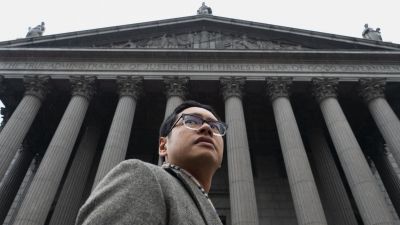Back in 2009 at Bill Moyers Journal, we asked all our guests to share with us their vision of the future of the American Dream. We’ve followed up with some of those guests and they’ve shared their thoughts with us on where the American Dream stands today. Tell us what is your vision for the American Dream on Facebook, Twitter, email or at (347) 974-4181.
Now
An advantage of the Russians, Chinese, Europeans, Africans and Latin Americans I know is that they do not labor under illusions. There is no Mexican Dream, no Italian or Korean or Belgian Dream; the Swedes have the Stockholm Syndrome and the Dutch, a successful people, have Dutch Disease. Despite Jeremy Rifkin the Europeans have at best a “European Project” and it’s not doing well. Only Americans have an “American Dream.”
What is the American Dream? A vulgar material aspiration according to the purveyors of suburban sprawl: house, car, kids and dog. The “city on the hill” of John Winthrop? That was a country built by slaves. Manifest Destiny, from “sea to shining sea”? That was a project to extend slavery into Mexico, which had banned it. The “can-do” spirit of the New Deal, World War II and the Great Society? That gave way about 40 years ago to what I have elsewhere called the “predator state.” A beacon of democracy? We did well with that one, in Iraq.
Over the course of history all nations have grand moments and exemplary leaders; the United States has had a few. But let’s not kid ourselves. At the moment, our constitutional system is a train wreck; our political leaders are a laughingstock; our banks and oil companies run the government. On the world stage we’re a nuclear-tipped loose cannon. Our economy is held together by the tatters of the safety net and by physical improvements which stopped happening, by and large, a half-century back. Far too many people are in prison; far too many take painkillers, far too many are dying young. To be clear-eyed and honest, is practically by definition to be excluded from the circles of money, influence and power; to rise above the municipal level in our politics, or in the press, you have to adhere to shibboleths that, outside the country, meet with scorn.
In the face of all this, the society is held together by a civic vision which remains, in spite of everything, broadly inclusive and broadly egalitarian. At the level of the ordinary population, more often than not, in ways large and small, basic decency remains.
Is that vision sufficient? Can it save us? Probably not. But we should cultivate it as best we can.
Then
I would like to see the country return to taking on its problems in a practical frame of mind, one by one, if you like, setting out what needs to be done, working out what the public sector should do and what the private sector should do, and getting down to the job. We’re going to have to fix the financial crisis. We’re going to have to fix the underlying economy. We’re going to have set a new direction to deal, among other things especially, with energy and climate change.
These are big, big tasks. They’re comparable to the New Deal and to what was done to win World War II. But they’re also different. They’re not the same thing. This period should not be confused with that one. It is the spirit of working out what works and doing it and using our government to get from where we are to where we need to be that seems to me that we need to recapture.
The idea that the government and the economy are enemies, that there is a specific ideological fix, these ideas are now dead. The ideas that came in with Ronald Reagan have gone out with Alan Greenspan. And they won’t come back. They certainly won’t come back in a generation. And we can take advantage of that if we’re prepared, not to substitute some other ideology, but to figure out what our problems are and to take the steps in an open-minded and open-handed way that are required to address them.
Send Us Your American Dream
Contact us on Facebook, Twitter, email or at (347) 974-4181.




